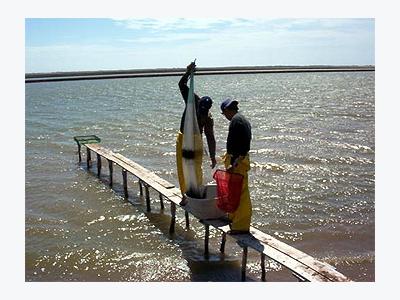New technology proves effective for EMS-hit shrimp farmer

This bacteria, which has both virulent and benign strains, causes acute hepatopancreatic necrosis disease (AHPND) or early mortality syndrome (EMS) in shrimp.
Shrimp farm. (Photo: Cosaes)
Mexico: A cutting-edge water treatment company claims its technology has been proven by third party researchers in lab and field trials as a powerful solution in the reduction and control of Vibrio parahaemolyticus, a bacteria which has been devastating the shrimp aquaculture industry.
This bacteria, which has both virulent and benign strains, causes acute hepatopancreatic necrosis disease (AHPND) or early mortality syndrome (EMS) in shrimp. This disease damages the digestive system of shrimp and causes mortality, often within thirty days of stocking.
AHPND has caused significant loss for the shrimp aquaculture industry worldwide, the result of which has been catastrophic loss in shrimp production, jobs and profit.
The company Silver Bullet says its innovative water treatment system was found to successfully reduce the amount of Vibrio parahaemolyticus, maintain those bacterial counts at low levels and promote shrimp survival. This system generates its disinfectant from ambient air onsite, so does not involve the risks and dangers associated with storing and handling toxic chemicals. The system has proven to be safe to shrimp and is designed in a way that is easy to install, user friendly and affordable.
Dr. Silvia Gomez and her team at Centro de Investigación en Alimentación y Desarrollo A.C. (CIAD) Government lab in Hermosillo, Mexico analyzed several different strains ofVibrio parahaemolyticus and worked on finding a solution to eradicating this devastating disease.
Recently, Dr. Gomez and her lab at CIAD have verified a dramatic increase in shrimp survival from the use of the Silver Bullet Water Treatment System. When applied to water, the patented and affordable technology has been proven to reduce pathogenic bacteria and biofilm, while maintaining a small residual of hydrogen peroxide for lasting biocide activity. The result has led to >90 per cent survival of shrimp in laboratory testing despite exposure to >100,000 (105) colony forming units (cfu) of the most pathogenic form of Vibrio parahaemolyticus.
In addition, the technology keeps calcium dissolved in water to promote the uptake of calcium ions for shrimp shell hardening and growth. It is postulated that shrimp with harder, healthier shells may stand a better chance at warding off pathogenic bacterial biofilms from forming.
“Most farmers throughout Mexico have been experiencing close to 80 per cent mortality of their shrimp in consecutive seasons over the last year. We have seen promising results in lab applications and now a full scale field application of the Silver Bullet Water Treatment system’s oxidizing capacity to reduce and control the levels of Vibrio parahaemolyticus, while causing no harm to the shrimp," stated Dr. Gomez.
"We have replicated lab tests where we found the exact doses of Silver Bullet gas needed to avoid reaching toxic levels of pathogenic strains of Vibrio parahaemolyticusand achieve high survival rates in the shrimp," the scientist added.
Dr. Donald Lightner, renowned researcher from the University of Arizona Shrimp Pathology Research Lab said they verified in their lab that "the Silver Bullet was able to successfully reduce the amount of Vibrio parahaemolyticus without having a toxic effect on the shrimp".
Silver Bullet has now announced that one Mexican farm using its system completed harvesting healthy shrimp and reported an average shrimp survival rate of 86 per cent.
The owner, Alberto Soto, of Grupo Quinto Día, said that like most of the other shrimp farms in Mexico, his company saw a dramatic drop in total production in 2013.
The four ponds - out of the thirty five total ponds on the farm - using the Silver Bullet technology reported an average survival rate of 86 per cent, which is much higher than the current industry average of 50 per cent survivability due to AHPND.
Có thể bạn quan tâm
 Whitespot resistant gene could save shrimp industry millions
Whitespot resistant gene could save shrimp industry millions White spot syndrome is still one of the most serious diseases for shrimp farmers across Asia and South America, with no effective way of combating it.
 The importance of dissolved oxygen in Pacific White Shrimp Culture
The importance of dissolved oxygen in Pacific White Shrimp Culture At present, industrial scale marine shrimp producers in almost every country produce the same kind of shrimp-- Pacific White Shrimp, or White Leg Shrimp
 Ongoing Studies Advance Intensive Shrimp Culture In Zero-Exchange Biofloc Raceways
Ongoing Studies Advance Intensive Shrimp Culture In Zero-Exchange Biofloc Raceways In ongoing trials of greenhouseenclosed intensive biofloc shrimp culture systems, the objectives of a 2012 study were to evaluate the performance